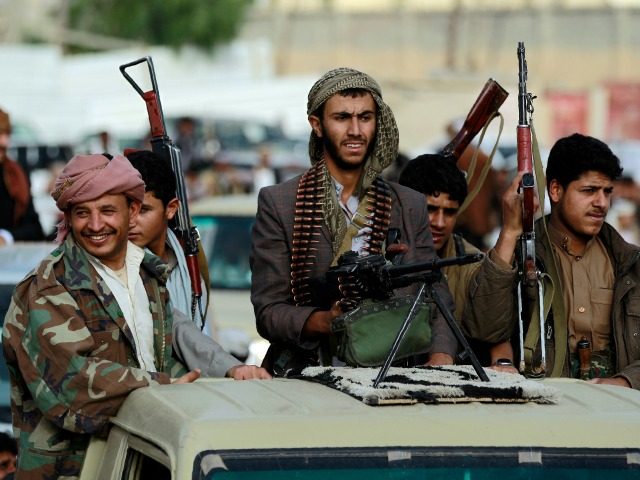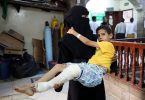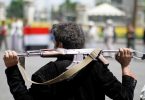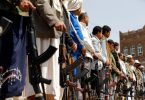In the center of Djibouti’s capital city, which is also named Djibouti, is a restaurant named Mohamed Ali Basha. It opened just over a year ago, and swiftly became popular with waves of Yemeni refugees, arriving in droves across the narrow strait that separates the Arabian Peninsula from Africa, fleeing conflict in their home country. At lunchtime, the restaurant’s two pastel pink–painted rooms are crammed with people breaking huge charred fish with their hands and rolling the pieces into traditional flatbread. The dishes here are simple, delicious, and serve as a kind of comfort food for Yemenis stranded in Djibouti. “This is their favorite food,” Mohammed al-Gobany, the restaurant’s manager, told me in May. Al-Gobany is himself a refugee, from the city of Ta’iz. He left Yemen seven months beforehand. After the lunchtime rush had passed, we sat and chatted about what he had seen as war tore his city apart.
Ad Policy
Ta’iz is in the central part of Yemen, between Sanaa and Aden. The city was once known for its 800-year-old hilltop castle and its many universities. “It was Zahrat al-Mada’en”—a flower among cities—“Now it is the ruined one among all cities,” another refugee, Rakeeb Muhammad, a 22-year-old computer science graduate from Taiz who is now living in Djibouti, told me. Yemen has been embroiled in a civil war since last year that has seen a Saudi-led coalition support the ousted president, Abdu Rabbu Mansour Hadi, against an armed movement from the north of the country called the Houthis. The Saudis say that the Iranians are supplying the Houthis, although there is scant evidence that Tehran has provided anything more than limited support for the faction. The Saudi-led coalition, on the other hand, is provided with logistical support by the United States, and much of the weaponry it uses also comes from this country.
The conflict continues to exact a horrific toll. According to the UN, more than 10,000 people have been killed, many of them civilians, and well over 3 million have been displaced. More than 180,000 Yemenis have fled to neighboring countries, the rest are refugees in their own country. The country’s cities are shattered. “Taiz is totally in ruins now. Hardly any residents are living there; no food, no petroleum products, nothing at all,” Muhammad said.
The United Nations has condemned the Saudi coalition’s “unrelenting attacks on civilians.”
After peace talks in Kuwait collapsed in early August, the Saudi bombing has intensified, turning other cities to rubble. Saudi defense spokesman Ahmad Asiri told reporters earlier this year that he envisioned a military attack on Sanaa, the nation’s capital, a city with a pre-war population of just under 2 million people, if a deal was not struck. “We have troops around the capital,” he said. “Sanaa will be free soon.” On September 12, a United Nations coordinator condemned the coalition’s “unrelenting attacks on civilians.” Just over a week later, on September 21, a bill to halt $1.15 billion of weapons sales to Saudi Arabia died on the Senate floor. Arguing against the bill was Republican Senator Lindsey Graham, who laid out the reasons to supply weapons to “our friends in Saudi Arabia” in the cool language of Realpolitik. “Saudi Arabia has shared intelligence with us,” he said. “They have allowed us to use their air bases in time of conflict. They are all in against I.S.I.L.”—another name for the Islamic State—“and they are great allies against the ambitions of the Iranians. When you add up the pluses and the minuses of the relationship with Saudi Arabia, in my view, it is not close. The pluses outweigh the minuses.” On the same day, an airstrike carried out by the Saudi-led coalition on the western port city of Hodeidah killed and injured dozens.
* * *
In July of 2015, Yemen’s tourist board tweeted two juxtaposed images of Taiz’s castle. The first image shows the building intact before the conflict, and the second shows it after the Saudi air force bombed it in May of last year because the Houthis were using it as a strategic base; only a few walls and battlements are left, surrounded by a pile of rubble. When the war began, Taiz fell quickly to the Houthis, but within a few weeks a local resistance force gathered. Allied with the Saudis, and later with groups affiliated to Al-Qaeda and ISIS, the resistance began to take the battle to the Houthis.
“We follow neither the Houthis nor the resistance.… we had nothing else to do but to leave to Djibouti.”
The citizens of Yemen have been caught between these two warring factions. Al-Gobany and others I spoke to from the city talked about random shelling and bombing from both sides. “We follow neither the Houthis nor the resistance,” al-Gobany told me. “We do not carry arms, so we had nothing else to do but to look for a job, for a source of income, and therefore we had nothing else to do but to leave to Djibouti.” Al-Gobany, 40, has a neatly trimmed mustache and thinning black hair. As we spoke he held a large wad of Qat leaves in his left cheek. Chewing Qat is, in al-Gobany’s opinion, “a social activity in order to meet friends.” “It connects you to other people,” he said. In Taiz, al-Gobany had worked as a day laborer, at times selling Qat and at others manning a friend’s shop. He made money every day, he told me, and lived in the Berbasha neighborhood of Taiz with his wife and two children, near the al-Saqr soccer stadium.
The situation in Taiz, according to al-Gobany, was fairly calm into early April last year. “We used to hear the shooting between the resistance and the Houthis and so on, but as ordinary citizens who have no interest in these things,” he said. But then, on April 18, al-Gobany was sitting with a group of friends chewing Qat in a two-story shop near the Bab al-Kebir, an ancient arched gate that leads into Taiz’s marketplace. There had been a power cut and everyone in the group was depressed. They wanted morning to come so they could see, and they were also unnerved by the sounds of shooting, which at that point only happened at night. Then they heard jets in the sky above them.
At around 2:00, al-Gobany decided to call it a night. “We had a yard at home, and I finished chewing the khat there. I had a cigarette and then I headed to go into the house. Suddenly the entire place turned red,” he told me. “The dark sky turned red.” He was seized with terror. “Whoever heard the bombing thought that his own house had been hit. This is how strong the explosion was. Then after five minutes, exactly five minutes, another bombing happened,” al-Gobany told me. Small stones were shaken from the roof of his building and hit him as he stood in the yard. He worried that the friends he’d just left behind were dead. “You would think it was judgment day,” he said.







